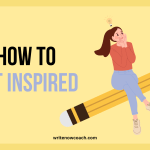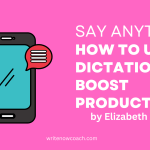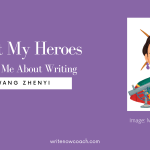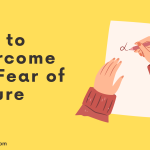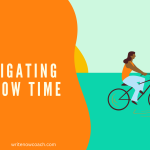Writers@Work: An Interview with Will Schwalbe
February 28, 2017
Note From Rochelle
Dear Writers,
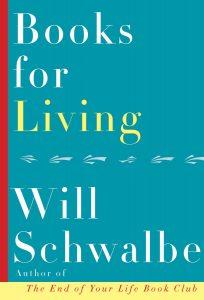 I have a lovely treat for you: an interview with Will Schwalbe, author of The End of Your Life Book Club and Books for Living.
I have a lovely treat for you: an interview with Will Schwalbe, author of The End of Your Life Book Club and Books for Living.
I often read four or five books at a time, because—well—you know how it is with books. I’m always reading a novel, but sometimes the book is too scary or deep or dark for bedtime. So I choose a bedtime book, usually a quiet memoir, a funny middle grade novel, or a collection of letters, like The Letters of Virginia Woolf. In the mornings, I can’t be trusted with the novel (‘just one more page’ becomes ‘just one more chapter’ and I never get to work) or the soothing books (potentially sleep inducing), so I read a nonfiction book to spark ideas and get me writing. With three books going, you’d think I’d be satisfied. Not quite. When I’m reading literary fiction, I crave mysteries. Or, when I’m reading thrillers, I yearn for a rest and desire a sparse, rich tale with ideas I can contemplate.
Do the math friends: if I’m reading four or five books at a time, I need oodles of books a year. (Clearly I wasn’t a math genius because five books at a time multiplied by x—how many books I read in a month—multiplied by 12 probably equals a bit less than “oodles.”) Still, you get the point. I read lots of books. I need many suggestions. I bother my friends, many of whom are librarians and booksellers, for suggestions. (Though I try not to call in the middle of the night when I’m sad and a bit lonely and need a quick book boost.) Thankfully, I’ve got a new source for my bookish yens: Books for Living by Will Schwalbe.
Will was kind enough to answer my questions about writing, reading, and his new book, Books for Living. If your a Milwaukee-area reader, be sure to attend Will Schwalbe’s event at Boswell Book Company on Monday, March 6 at 7:00 PM.
Enjoy!
Rochelle,
the Write Now! Coach

Rochelle: First, thank you for your book! I recently saw a display of your book—and the books you recommend—at Boswell Book Company and picked up Zen in the Art of Archery, which is wonderful. How do you discover such interesting, unique books?
Will: Thank you for reading the new book—and for all you do for readers and writers. As for Zen in the Art of Archery, I’m so glad that Boswell Book Company and I helped you discover it. There are so many ways I find books – but one of my favorites is very simple: I ask everyone I meet, and I mean everyone, “What are you reading?” It’s a simple question but a really powerful one. Sure, a lot of time you will find that people will say that they aren’t reading anything at the moment – or don’t have time to read – or don’t like to read. But much of the time you’ll find that people light up – eager to share with you a recommendation and get one from you.
Another way I discover books is to let one book lead to another. So, for example, if I’m reading one of Donna Leon’s fantastic mystery novels, which are set in Venice, I might next read a history of Venice. Or if a writer “blurbs” a book I love, then I might read a book by that writer. Or it might even be something truly arbitrary. For a while I read every book I could find with the word “salt” in the title: The Book of Salt by Monique Truong, As Meat Loves Salt by Maria McCann, The Price of Salt by Patricia Highsmith, Salt by Mark Kurlansky…all wonderful books as it turns out.
I think one of the things that intrigued me about Zen in the Art of Archery was the similarity in title to a book I had read and loved: Zen and the Art of Motorcycle Maintenance by Robert Pirsig, which followed it by decades. I think Pirsig must have been inspired in part by Zen in the Art of Archery, the granddaddy of all such Zen in and Zen and books.
Still another way I discover books is a technique vastly aided by my clumsiness. I believe if you knock over a book in a bookstore, then you have to buy it – it’s the universe telling you that you need that book. (In a library, if you knock one over, you must check it out).
Oh, and then there’s this: I go to a great independent bookstore like Boswell Book Company and put myself in the hands of one of the booksellers. I simply name a few books I love and ask the bookseller what to read next. I’ve found some of my favorite reads that way. (Ditto for asking librarians).
But I should also mention: I love to read books about books, and about the ways books and lives intersect. They are a great source for inspiration and recommendation. That’s why I write them. Oh, and one more way: Goodreads!

As a writer and avid reader, I recommend that writers read widely and voraciously. Can you talk about how reading has shaped your writing?
Well, we seem to share this advice! I really don’t think it’s possible to be a writer unless you are a reader. And reading widely and voraciously, as you put it, is essential. Reading helps me inhabit other lives – every time I read a book I believe I become a little more empathetic. And I think empathy is one of the keys to writing. Reading widely also helps me learn more about myself – as I test my thoughts and opinions and feelings and moral sense against those of characters in books and of other writers. Reading also gives me new ideas and helps me make connections and see my life and experiences in a fresh light.
But also important for me is this: Reading inspires my writing. When I read something great then it reminds me why I want to write: I want to do for people what my favorite authors have done for me.
I should add one thing – I do sometimes limit my reading by voice or genre. For example, if I’m working on a chapter or passage that’s essentially memoir, and I start reading a book about a similar incident in another writer’s life, or that feels close in voice to mine, then I’ll stop and wait until I’m done with that bit of writing. Sometimes a book can get too much in your head and make you feel that what you are writing is redundant. And of course, you must never feel that.

You have worked in publishing and are the founder a popular cooking website (Cookstr). What advice do you have for writers?
Well, we’ve already covered the first important point: Writers must read. And must read widely. The second is kind of obvious, but I need to remind myself of it constantly: Writers must write. On days when I write I’m a writer. On days when I haven’t, I’m someone who has written.
I also find that there are some wonderful books about writing, and I recommend these to anyone I know who wants to write: Bird by Bird by Anne Lamott, On Writing by Stephen King, and The Forest for the Trees by Betsy Lerner are three great ones.
Time to write is always tough. I’m not one of those people who can write for a few hours in the morning. I need a whole day to waste in order to find a few writing hours. But I’ve always had a full-time job when writing. So I block out the entire weekend, almost every weekend, and also write over my vacations. Then again, I don’t have kids. I’m in awe of my friends who have jobs and children and still find time to write. I have no idea how they do it, but they do.
And one more thing that can be hugely helpful is to find a community of writers with whom you can share thoughts, tips, contacts, frustrations, and successes. This isn’t as hard as people think it is: the key is to find people who are at the same point in their career as you are, or maybe just one step ahead. If you are just starting to write, seek out a local writer’s group where you can meet people who are a bit farther along. If you have finished a book, find a writer who has just published one. Clearly, a letter to Margaret Atwood or Salman Rushdie might not be answered or might not lead to a friendship even if it is. But if you go to your local bookseller and ask for recommendations of first books by local authors, you will discover great riches. And writers who have just published their first novel or work of non-fiction are often delighted to hear from serious readers who have enjoyed their books. They may well be happy to give some advice, especially to someone who has been spreading enthusiasm on social media. I know a lot of writer friendship that have started in that exact way.
In the Introduction to your book, you say, “What follows are stories of books I’ve discovered that have helped me and others in ways big and small with some of the specific challenges of living in our modern world, with all its noise and distractions.” What book do you recommend for readers who are overwhelmed by all of the political noise these days?
At the risk of being self-promotional, I hope that some people will find my recent book to be helpful if they are feeling overwhelmed by all the political noise. One of the points I most wanted to make in Books for Living is that we need to be readers now more than ever, and that we need to read all different kinds of books. We also need to think more and plan more and not just react to everything every second. They say, “You write the book you need.” So I really tried to write this one to remind myself of the importance of slowing down and disconnecting from time to time.
But I also write that reading comes with responsibility. I hope to remind people that reading is one of the strongest bulwarks we have against domination and bigotry and narrowness and mind control. And to remind people, and myself, that when you read about injustice you need to do something about it.
While I do often read for comfort and solace, sometimes I read not to get less mad but more. I think it’s important to read in order to figure out what should be making us most mad. For example, when I read a book like Just Mercy by Bryan Stevenson, it reminds me that I need stop worrying about some of the nonsense that distracts me but worry more (and do more) about issues of racial and economic injustice in the courts and elsewhere. That might start with something as simple as sending a check to Stevenson’s Equal Justice Initiative.

What are you reading now?
I’m just starting to read Min Jin Lee’s new novel, Pachinko. It’s the story of a Korean family and it spans decades. I love it; in fact, the minute I finish this interview I’m going back to it. After that, I can’t wait to read Alex George’s new novel, Setting Free the Kites. He’s a brilliant writer. Reading the flap I see it’s set in the 1970’s and involves, among other things, an exploration of friendship. I’ve heard great things about it.
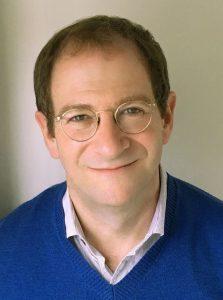
About the Author. Will Schwalbe has worked in publishing; in new media (as founder of cookstr.com), and as a journalist. His previous book was The End Of Your Life Book Club, which spent twelve weeks on the New York Times bestseller list in hardcover and paperback, was named an Entertainment Weekly Best Book of the Year, was one of Amazon’s top four best books of the year, won an Indie Choice Honor Award, and was awarded the Books for A Better Life Award for Best Inspirational Memoir. It has been translated into ten languages. He is also the author with David Shipley of Send: Why People Email So Badly and How to Do It Better. His newest title, Books for Living, describes the role that a wide variety of books can play in our lives and shows how a few specific and unusual books that Schwalbe champions can help us live each day more fully and with more meaning. He tweets @WillSch
Write Now! Coach Rochelle Melander reads too many books but still somehow managed to earn a bunch of degrees and write ten books including Write-A-Thon: Write Your Book in 26 Days (And Live to Tell About It). As the Write Now! Coach, she teaches professionals how to write books fast, get published, and connect with readers through social media. She tweets @WriteNowCoach



